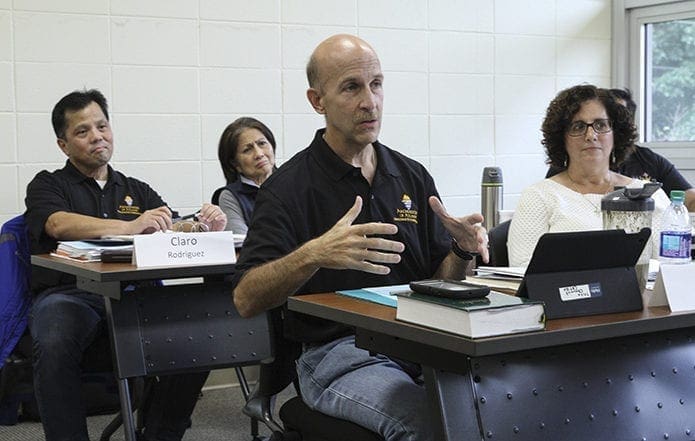 Photo By Michael Alexander
Photo By Michael AlexanderAtlanta
Formation of permanent deacons a time of discernment
By NICHOLE GOLDEN, Staff Writer | Published November 21, 2018
ATLANTA—From application to ordination the formation process for the permanent diaconate takes roughly six years.
The application process alone for those interested in exploring serving as a deacon can take eight or nine months. After acceptance, the formation includes a year of aspirancy and four of candidacy, and involves classes, reflections and retreats. Atlanta’s permanent diaconate formation program is led by Co-Directors Deacon José Espinosa and Penny Simmons.
“During all this, it’s a time of discernment for the man,” said Simmons.
The co-directors succeeded Deacon Steve Swope in heading the formation program taking the reins together in 2013. Deacon Swope, who serves at St. Mary Magdalene Church, Newnan, had served as the director for five years. He was tapped to bring Atlanta’s formation program up to the standards outlined in the National Directory for the Formation, Ministry, and Life of Permanent Deacons in the United States.
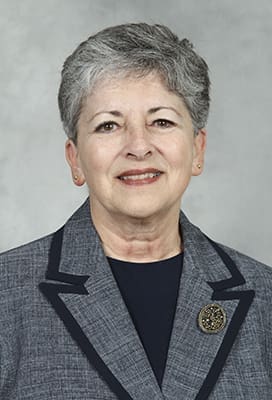
Penny Simmons
Associate Co-Director of Formation
Wives are very involved in the formation of their husbands as deacons, from start to finish. Those who attend 80 percent of the formation classes with their husbands on an audit or listening basis, receive a master catechist certificate. Most wives find they attend more than 80 percent of the courses.
“I’m finding out it’s kind of unique to Atlanta,” said Simmons about the wives’ participation.
Deacon Espinosa, ordained in 2009, never anticipated coming back to class after ordination.
His answer when recruited with Simmons to be a co-director of formation was, “Let me think about it.” It was his wife, Rhaiza, who encouraged him to take the role, saying, “Are you going to say ‘no’ to God?”
It was also Deacon Espinosa’s wife who first suggested he explore the permanent diaconate. He didn’t know much about the role of a deacon at first.
Since ordination in 2009, he has served at St. Joseph Church and Transfiguration Church, Marietta; St. Catherine of Siena, Kennesaw and Our Lady of the Americas Mission, Lilburn.
“I was blessed I was ordained for a mission,” said Deacon Espinosa. His experience at the mission with marriage preparation, and conducting funerals and baptisms, proved invaluable in helping candidates prepare.
Deacons by the numbers
In the archdiocese, there are 279 deacons; 235 of them in active ministry. There are typically 45-50 in formation at any given time. The class to be ordained in 2019 has eight men. The following year, nine men are set to be ordained.
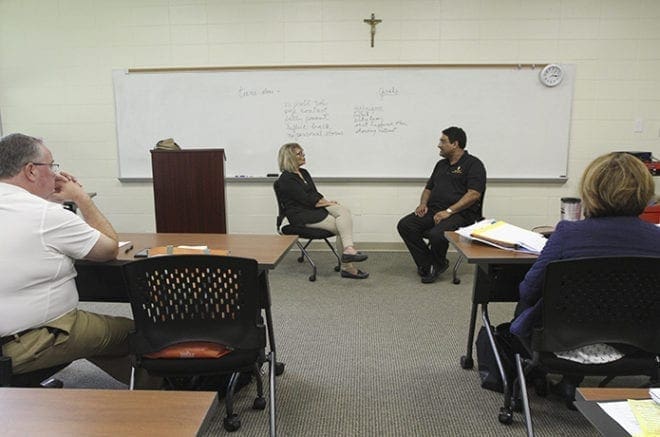
Dev Lobo of Transfiguration Church, Marietta, right center, participates in a mock counseling session with his instructor, Sandra McKay. Lobo is scheduled to be ordained in 2020. Photo By Michael Alexander
From the teachers of classes, to staff at the Chancery, and those who help organize retreats and days of reflection, the co-directors are bolstered by many in their efforts. Atlanta’s program is also unique in that it is not attached to a university or seminary.
“There must be 100 people who support us,” said Simmons.
After the year of aspirancy, the men petition to become candidates, and there are steps during candidacy such as institution as a lector and then acolyte to take on additional duties at the parish level.
After a pre-determined time in candidacy, a man may petition the Archbishop to be ordained which requires their wife’s signature.
Simmons said the formation program encompasses a person’s human, spiritual and intellectual sides as well as offers pastoral support.
“Those all have to be in balance,” she said.
The formation teachers are priests, deacons, and laywomen and laymen—from theology teachers to Sister Margaret McAnoy, IHM, vicar for religious, who covers Catholic spirituality.
Aspirants and candidates meet on Saturdays at the St. Stephen Center on the campus of St. Paul of the Cross Church, Atlanta. Class days begin with Mass. Aspirants meet once a month for a year, and candidates twice a month.
Aspirant topics might include Psalms and the Prayer of the Church, introduction to theological studies, reading Scripture in context and Catholic social teaching. For candidates, classes include more detailed topics ranging from the history of the Hebrew people, canon law, Vatican documents, theology, liturgy and practicums on both liturgy and homilies.
“We see it as formation, not education,” said Simmons.
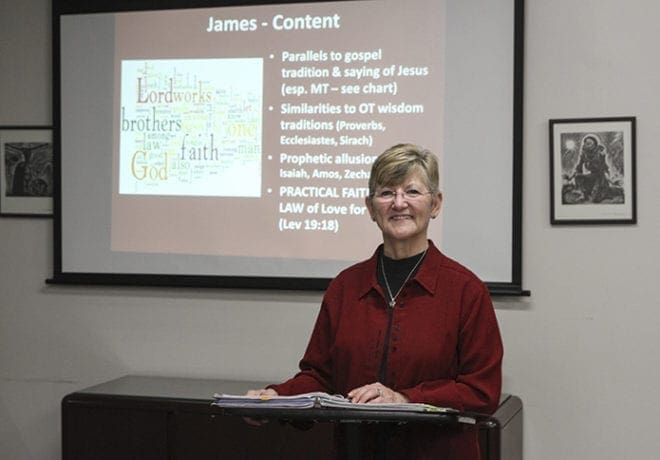
Kathy Hoffman has taught classes for the permanent diaconate formation program since 2012. Hoffman, a member of St. Thomas Aquinas Church, Alpharetta, taught theology at Blessed Trinity High School, Roswell, for 11 years. Photo By Michael Alexander
Application requirements for aspirancy include a high school diploma and capability of taking on college level studies. Applicants most have stable employment and sound financial history, in addition to meeting age requirements, and providing evidence of a stable and growing marriage.
“They have a foot in the world that is real,” said Deacon Espinosa.
Post-ordination, programs of continuing education are a must for deacons and the co-directors continually learn as well.
The reward of formation
Both Simmons and Deacon Espinosa had other careers before coming on board as the co-directors. They find this work spiritually rewarding.
“My reward is seeing the face of the guys when they get ordained,” said Deacon Espinosa. The 2019 diaconate ordination falls on Jan. 26, the deacon’s birthday.
Simmons, whose office at the Chancery features artwork of lighthouses, finds it inspiring “to be the servant of those who will be the servants of God.”
Deacon Dennis Dorner is director of the permanent diaconate overall. While Deacon Dorner began his ministry at St. Brigid Church in Johns Creek in 2004, he never envisioned his ministry would eventually include serving as the diaconate director, as chancellor, leading the Office of Life, Dignity and Justice, and chairing the Eucharistic Congress committee.
“Working with the team that leads our diaconate formation program is very humbling, knowing that we are preparing those men who will be ordained for servant leadership here in the archdiocese for years to come,” he said.
He most recently was asked by Archbishop Wilton D. Gregory to serve as interim administrator for St. Luke Church, Dahlonega.
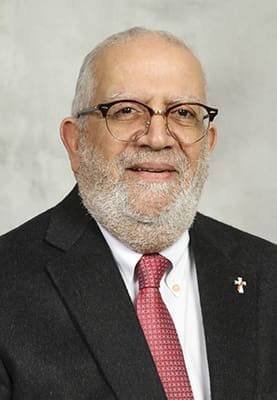
Deacon José Espinosa
Associate Co-Director of Formation
Exploring the diaconate must be a God-centered decision, say Simmons and Deacon Espinosa.
“Definitely pray and if you are married, pray with your wife,” she advised. “The first priority is you and your God.”
“Without your wife, you are nowhere,” agreed Deacon Espinosa.
He urges men who are interested not to jump to thinking about the ordination. “Your call is to be here,” he said about the formation classes.
If you are thinking too far in the future, you are missing out on a wonderful process, he said.
Deacon Espinsoa shared that the diaconate was not renewed because of a shortage of priests, but rather because there were not enough deacons exercising their unique gifts.
“It’s a wonderful, wonderful ministry that the church has revitalized,” he said. “We are not mini-priests.”
Deacon Dorner has words of encouragement for those considering a call to the diaconate.
“Be not afraid! I love being a deacon. I ran from the call for a long time,” he said. “I know that all things happen in God’s time not ours so I have no regrets about when and how I received the call. I am so grateful, however, for the support of a wife and family who understand that this is not something done for personal edification but because God made the call … and I thankfully answered ‘yes.’”